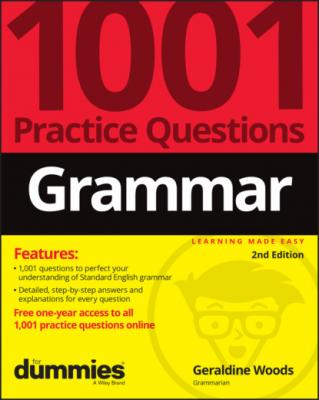Grammar: 1001 Practice Questions For Dummies (+ Free Online Practice). Geraldine Woods
Чтение книги онлайн.
Читать онлайн книгу Grammar: 1001 Practice Questions For Dummies (+ Free Online Practice) - Geraldine Woods страница 11

46. The teacher _____ (to staple) the drawings on the bulletin board so that the parents could admire their children’s artwork.
47. By the time Eleanor and Henry are satisfied with the renovation, they _____ (to exceed) their budget by a wide margin.
48. Where the tulips _____ (to bloom), weeds eventually covered every inch of the garden.
49. In Maya’s fantasy novel, a wizard’s curse _____ (to turn) a little boy into a frog.
50. Amanda and her friends _____ (to study) Chinese for four years by the time they travel to that country.
51. Joe _____ (to practice) karate for many years and still takes an advanced class every Saturday.
52. In Shakespeare’s Othello, the title character wrongly _____ (to trust) Iago, one of the most evil villains in literature.
53. LGA Manufacturing has an old-fashioned policy; the company _____ (to market) its products only in a store, not on the internet.
54. If my dog buries a bone every three days, how many _____ (to bury) by the end of the month?
55. In Dickens’s classic novel Great Expectations, Pip _____ (to learn) the identity of his benefactor in a chilling scene.
Consistently Choosing the Right Verb Tense
56–65 Select the tense and form of the verb in parentheses that fits the meaning of the sentence. Take care to avoid unnecessary shifts from one tense to another.
56. In my dream, a giant dinosaur ran into my dining room, and then he _____ (to stroll) around the room.
57. Perhaps because the president _____ (to campaign) for the mayor, the mayor won by a huge margin.
58. Linda _____ (to enter) the cafeteria and sits next to the most hated teacher in the entire school!
59. The orchestra _____ (to insure) the instruments every year, so no one ever worries about storm damage after the hurricane.
60. Last year I traveled to Europe, but next year I _____ (to tour) Asia.
61. In response to the reporter’s question, the zookeeper said that the lion _____ (to be) very friendly.
62. Morty declared that eight added to ten _____ (to equal) eighteen.
63. Arthur told me that he _____ (to need) a loan until payday and asked me to give him $10.
64. Shana reported that at the end of every show, the ballet dancers _____ (to bow) and ignored the boos from the audience.
65. The astronomer told the youngsters that the earth _____ (to revolve) around the sun.
Chapter 2
Working with Irregular, Helping, and Descriptive Verb Forms
Life would be boring if everything followed the same pattern, wouldn't it? A little variety can pep up your day. It can also ruin your day if the variation is an irregular verb — and the English language has many. Not to worry: In this chapter you practice selecting irregular verbs, changing meaning with helping verbs (should, can, may, do, does, did, and the like), and employing verb forms that can act as descriptions, which grammarians call participles and infinitives and the rest of us call “pains in the neck.”
The Questions You’ll Work On
In this chapter, you work on questions that develop these skills:
Using irregular past-tense and participle forms correctly
Selecting the proper form and tense of the irregular verbs to be and to have
Adding shades of meaning with the helping verbs should, must, can, could, may, might, and would
Creating questions with helping verbs
Identifying participles functioning as descriptions
Choosing the best form of participles and infinitives used as descriptions
What to Watch Out For
Keep these points in mind when you answer the questions in this chapter:
Check whether the past-tense form or participle is regular or irregular.
Choose the correct tense of irregular verbs based on the meaning of the sentence.
Employ reading comprehension skills to detect the need for a helping verb expressing obligation, possibility, condition, or ability.
Rearrange word order and add helping verbs to create questions.
Select present participles or infinitives as descriptions for actions in the past, present, or future.
Handling Irregular Verbs
66–90 Choose the proper past, present perfect, past perfect, or future perfect form of the irregular verb in parentheses so that the verb fits the meaning of the sentence.
66. Joe _____ (to catch) the ball as it reached the top of the outfield fence.
67. The car was cruising along the highway smoothly until it _____ (to hit) a huge bump.
68. Dorothy and the baby _____ (to sleep) for two hours when they returned from a visit to Grandma.
69. At the end of the trial, Judge Ann Marie Smith _____ (to rise) from her chair and left the courtroom.
70. Last week, the Yankees _____ (to beat) their fiercest rivals.
71. From 2010 through 2011, the confused clerk _____ (to put) all the forms in the wrong file cabinet.
72. The helicopter _____ (to fly) straight up into the sky and then headed south.
73. George _____ (to see) Miss Duke, his little dog, and grabbed her before she could run away again.
74. I didn’t know that you _____ (to swim) in the deep water last summer; I thought you were less advanced in your swimming skills.
75. Nelson wouldn’t _____ (to get) sick if he had washed his hands more frequently.
76. The bully approached, but because my uncle _____ (to teach) me how to handle difficult people, I wasn’t afraid.
77. The doctor _____ (to do) everything in his power; now Allison must wait for the medicine to take effect.
78. Miriam _____ (to let) the dogs out for a few minutes, but she will call them inside soon.